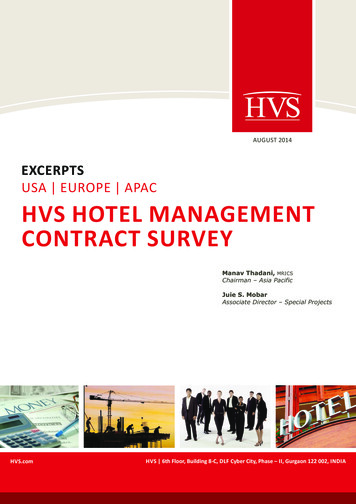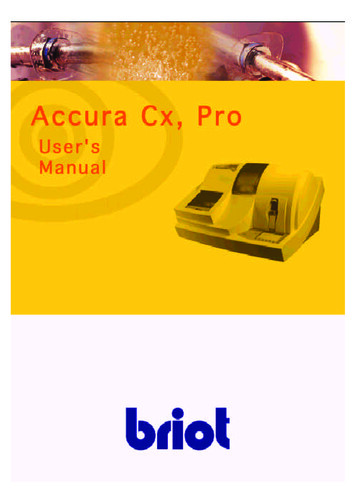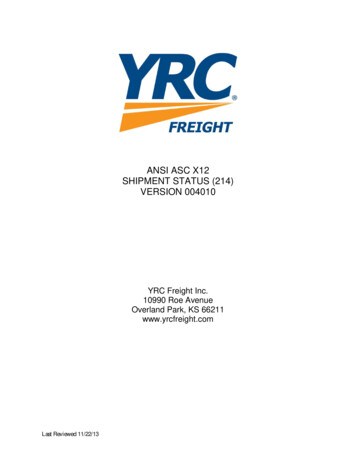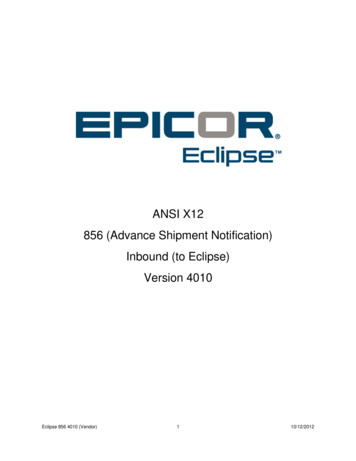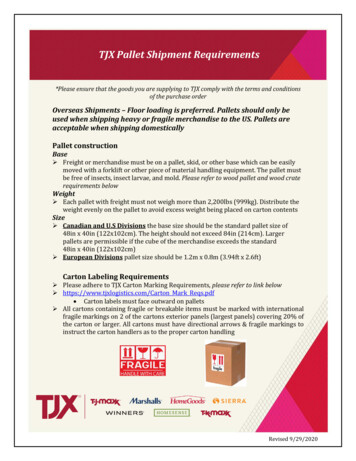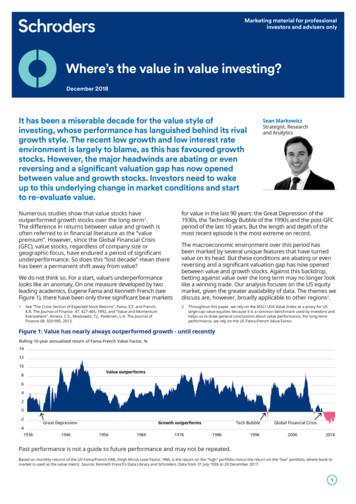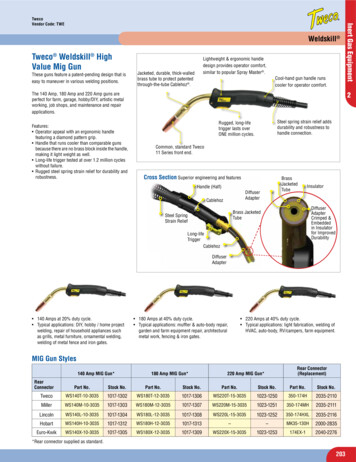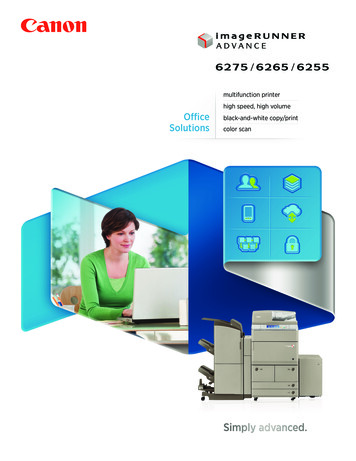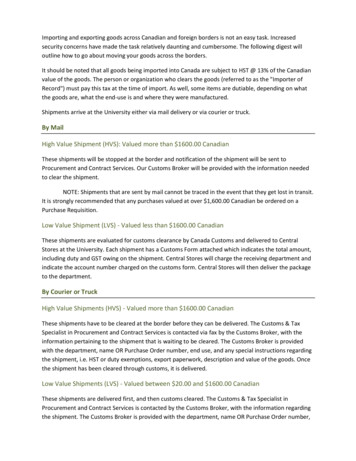
Transcription
Importing and exporting goods across Canadian and foreign borders is not an easy task. Increasedsecurity concerns have made the task relatively daunting and cumbersome. The following digest willoutline how to go about moving your goods across the borders.It should be noted that all goods being imported into Canada are subject to HST @ 13% of the Canadianvalue of the goods. The person or organization who clears the goods (referred to as the "Importer ofRecord") must pay this tax at the time of import. As well, some items are dutiable, depending on whatthe goods are, what the end-use is and where they were manufactured.Shipments arrive at the University either via mail delivery or via courier or truck.By MailHigh Value Shipment (HVS): Valued more than 1600.00 CanadianThese shipments will be stopped at the border and notification of the shipment will be sent toProcurement and Contract Services. Our Customs Broker will be provided with the information neededto clear the shipment.NOTE: Shipments that are sent by mail cannot be traced in the event that they get lost in transit.It is strongly recommended that any purchases valued at over 1,600.00 Canadian be ordered on aPurchase Requisition.Low Value Shipment (LVS) - Valued less than 1600.00 CanadianThese shipments are evaluated for customs clearance by Canada Customs and delivered to CentralStores at the University. Each shipment has a Customs Form attached which indicates the total amount,including duty and GST owing on the shipment. Central Stores will charge the receiving department andindicate the account number charged on the customs form. Central Stores will then deliver the packageto the department.By Courier or TruckHigh Value Shipments (HVS) - Valued more than 1600.00 CanadianThese shipments have to be cleared at the border before they can be delivered. The Customs & TaxSpecialist in Procurement and Contract Services is contacted via fax by the Customs Broker, with theinformation pertaining to the shipment that is waiting to be cleared. The Customs Broker is providedwith the department, name OR Purchase Order number, end use, and any special instructions regardingthe shipment, i.e. HST or duty exemptions, export paperwork, description and value of the goods. Oncethe shipment has been cleared through customs, it is delivered.Low Value Shipments (LVS) - Valued between 20.00 and 1600.00 CanadianThese shipments are delivered first, and then customs cleared. The Customs & Tax Specialist inProcurement and Contract Services is contacted by the Customs Broker, with the information regardingthe shipment. The Customs Broker is provided with the department, name OR Purchase Order number,
end use, and any special instructions regarding this shipment, i.e. HST or duty exemptions, exportpaperwork, description and value of the goods. The Customs Broker uses this information to clear theshipment with Canada Customs and generates an invoice to the University.Problem ShipmentsShipments get held at the border, either by Canada Customs or by the courier/carrier when thefollowing problems occur on the shipper's paperwork: zero or no dollar value indicated (even "free" samples have a value)unrealistic value reported (Customs wants to see the "fair market value" of the goods reported)insufficient description of the goodsconsignee's name and/or address missing or incompleteCanadian Food Inspection Agency inspectionCustoms Broker not indicatedIn these cases, the shipment is handled in much the same way as a High Value Shipment, where all theshipment information must be provided by the Customs & Tax Specialist before the shipment will bereleased.Personal ShipmentsPersonal shipments should NOT be addressed to the University. It is unlawful for individuals to addresspersonal shipments to the University. It is also the University’s practice to NOT clear any shipments thathave been ordered on personal credit cards. Individuals who wish to order goods must do so by eitherusing a University of Waterloo Purchase Requisition or Online Requisition OR by using a Universityissued Purchase Card. Shipments that cannot be attached to one of these methods will not be clearedand it will be the individual’s responsibility to make arrangements for Customs clearance directly withthe courier company. There is a cost in time of University staff verifying that the shipment is not for theUniversity. There are legal/functional (warranty) issues if the University becomes the Importer ofRecord, and finally, the shipment will likely experience a lengthy delay as our staff try and determine towhom this shipment belongs.By MailIf a personal shipment arrives by mail you will need to provide personal cheque.Freight and Brokerage ConsolidationProcurement and Contract Services works closely with Russell A. Farrow warehouse in Depew, NewYork. All U.S. shipments that are not extremely time-sensitive and/or perishable are routed to Russell A.Farrow, where they are consolidated and delivered to UW on Tuesdays and Thursdays. Takingadvantage of U.S. domestic shipping rates has resulted in a 40% savings in freight costs.All shipments being sent to the University of Waterloo are to be shipped via one of the following optionsand criteria:
Extremely time-sensitive and/or perishable: Federal Express - account #118186400Shipments weighing less than 200lbs/91kg: UPS domestic ground (ppd & charged - NOT Collect)to:University of WaterlooPO#/namec/o Russell A. Farrow2916 Walden Ave., Suite 400Depew, NY USA 14043-2610Telephone: 716-631-2000Shipments weighing over 200lbs/91kg: contact Thompson Ahern International for shipping instructionsat 905-678-5483Note to U.S. Suppliers:Please be reminded that when shipping to the University of Waterloo, you must include CanadaCustoms documents and NAFTA Certificates of Origin to ensure that the goods do not get held up inCustoms and we are not charged duty in error. Failure to do so could result in a deduction from yourinvoice for the costs involved in obtaining such documents. Also, all shipments must reference aPurchase Order number OR a contact name and department, and Thompson Ahern as the University'sCanadian customs broker.Exclusion from DutiesEach year, a new listing of the Customs Tariff is released by the Canada Border Services Agency. Thetariff, which uses the "Harmonized System" of classification, lists the rates of duty applicable for everyitem that is imported into Canada. This duty rate is dependent on the Country of Origin of the goods oron the actual goods themselves.NAFTA (the North American Free Trade Agreement) is used to reduce duty rates on most productsoriginating from the United States and Mexico. It is important when ordering goods from thesecountries, to request that a NAFTA Certificate of Origin be provided by the supplier of the goods, inorder to avoid paying duties unnecessarily.Items Shipped Out of CanadaWhen goods are shipped out of Canada, documentation must be prepared for customs clearance intothe country they are being shipped to. All items shipped off campus should be processed in the Agileshipping system. When the goods return to Canada, they must be accounted for with Canada Customs.UW must provide our Customs Broker with export documentation (waybill) to prove that the item is areturn and not a new purchase. If the item was shipped out for repair, the value of the repair is usedwhen calculating duty or GST applicable. There is no duty or GST paid on warranty repairs but Customs
does need a value of the repair for its records. Warranty replacements do not require proof of exportand are not assessed duty or HST.Hand-Carried ShipmentsHand-Carried Shipments are shipments that are physically driven to one of the border crossings by UWstudents or employees. As with shipments that are sent out by courier, hand-carried shipments alsorequire customs clearance into the U.S. If you know that you are going to be travelling outside of Canadawith University-owned goods, please contact the Customs & Tax Specialist in P&CS to determine thebest shipment method for your trip (see below). Failure to follow the correct procedures could result inU.S. Customs refusing you entry when you arrive at the border, as well as significant fines for theUniversity. Please contact Christine Henderson at extension 32854 or email chenders@uwaterloo.ca.There are currently three methods available to UW travellers who are hand-carrying goods out ofCanada:Temporary Import BondA TIB allows UW-owned goods to enter the U.S. without attracting any U.S. duties. A TIB can only be setup by UW's Customs & Tax Specialist who works closely with our U.S. customs broker, LivingstonInternational. TIBs must be cancelled by the UW traveller before the goods leave the U.S. In order tohave a TIB set up, the Customs & Tax Specialist must be provided with all the trip details at least fourdays prior to your departure. The cost to the traveller for having a TIB set up is approximately 200Canadian.CARNETCARNETs are set up directly between the UW traveller and the Canadian Chamber of Commercehttp://www.chamber.ca/article.asp?id 259. A bond needs to be set up and security posted according tothe value of the shipment, so the cost for this method is higher than that for a TIB. On a shipment valuedaround 60K the fee for this method would be around 600. However, a CARNET is valid for a year so ifyou expect multiple shipments of the same goods to the same location, this method may save youmoney in the long-run.Itemized ListThis method also does not involve the Customs & Tax Specialist but is the method that carries thehighest risk. The traveller must carry a detailed list of all the items being taken into the U.S. The list mustinclude the description, size/weight, colour, cost and part number for each item. Before leaving Canada,the traveller must go to the Canadian border patrol office and explain the trip. Canada Customs willstamp the list as proof that all items originated in Canada. The stamped list is crucial. The stamped list isthen shown to the American border guards and the purpose of the trip is explained. It is important tohave supporting documents in case the guards question the trip. Documents such as an official invitationfrom the competition organizers, letter of support from the Dean, proof of hotel reservations, etc. Uponreturning to Canada, the stamped list is shown to the Canadian border guards. These guards should giveyou no hassle because the list has the Canadian stamp of approval. There is no cost to this method but
depending on what border guards you get, they could either let you go through or they may tell you thatyou need a customs broker to clear your shipment. In this case, you could be delayed for hours or evendays (if you are travelling on a weekend) because UW's customs broker will not do anything withoutauthorization from the Customs & Tax Specialist.Each procedure can be beneficial, depending on your requirements. Please contact Christine Hendersonat extension 32854 for additional information and guidance.Who is Our Customs Broker?UW has two customs brokers. For shipments coming into Canada, Thompson Ahern is our broker. For alloutgoing shipments to the U.S., Livingston International is our U.S. broker. These brokers act on behalfof the University of Waterloo in all Customs transactions.What They Do Classify goods within the Harmonized System and prepare documents to clear Universityshipments through Customs.Check customs information for possible benefits for the University-duty and tax exemptions,prepare documents and post bonds for the temporary importation of goods.Pay necessary duties and taxes to Revenue Canada on behalf of the University.For more questions regarding customs procedures, please contact the Customs & Tax Specialist at (519)888-4567 x32854, or email chenders@uwaterloo.ca
Canada: Temporary Import Bond A TIB allows UW-owned goods to enter the U.S. without attracting any U.S. duties. A TIB can only be set up by UW's Customs & Tax Specialist who works closely with our U.S. customs broker, Livingston International. TIBs must be cancelled by the
